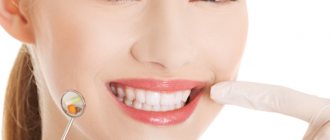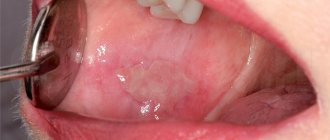Bad breath, which can become a constant companion of a person, can ruin relationships with others and reduce self-esteem. This condition is called halitosis, or halitosis. It is not an independent disease, but is one of the important symptoms of pathologies of the oral cavity and internal organs. You can drown out the stench with mints, spray or chewing gum, but this will not get rid of the problem. We need comprehensive diagnostic measures and subsequent elimination of the causes of halitosis.
Why does there be an unpleasant odor?
The oral cavity is the beginning of the digestive tract. It contains many bacteria; saliva contains enzymes that can break down carbohydrates. Therefore, after waking up, all people have bad breath. But this condition is not considered a pathology; it is enough to brush your teeth for the smell to disappear.
A persistent unpleasant aroma appears after eating dishes with garlic, onions, and some spices. When alcohol is abused, the sour stench persists for a day or more, which is associated with the metabolism of ethyl alcohol in the liver and the release of its vapors through the lungs.
A large number of unpleasant aromas accompany diseases that affect metabolism. In patients with diabetes who do not follow a diet or use insulin incorrectly, when ketone bodies accumulate in the blood, the smell of acetone appears on their breath. People suffering from kidney failure will repel those around them with the unpleasant aroma of urea, which the kidneys cannot remove from the body.
Common causes in adults are pathologies of the digestive tract. Halitosis is caused by:
- gastritis with high acidity;
- stomach ulcer, duodenal ulcer;
- cardiac sphincter insufficiency;
- esophageal diverticula;
- malignant tumors of the stomach or esophagus.
Respiratory diseases can also cause an unpleasant odor. Air from the lungs passes through the oropharynx, so it can partially leave the body through the mouth. It smells unpleasant with purulent diseases of the sinuses, chronic runny nose or tonsillitis.
Diagnostics
With the problem of bad breath, patients usually turn to a dentist or gastroenterologist. The doctor conducts a diagnostic complex according to his profile, and, if necessary, prescribes consultations with related specialists. To detect many dental diseases, a visual examination of the oral cavity is sufficient. For halitosis, the following laboratory and instrumental methods are used:
- ENT examination.
Standard examinations are performed - anterior and posterior rhinoscopy, pharyngoscopy, indirect laryngoscopy. During the examination, the doctor takes a swab from the throat and nose for analysis. If there are changes in the tonsils, it is necessary to carry out bacteriological culture of the plaque. - X-ray examination.
An orthopantomogram is recommended for dental diseases to assess the extent of the process. X-ray examination of the gastrointestinal tract with contrast is informative in the diagnosis of ulcers, diverticula, and neoplasms. X-ray of the paranasal sinuses is a method of confirming sinusitis. - Endoscopic methods
. EGD is used for suspected chronic gastritis. Upon examination, hyperemia of the gastric mucosa, the presence of erosions, and impaired tone of the cardiac and pyloric sphincter are determined. Bronchoscopy is necessary to confirm bronchiectasis. - Analyzes
. A hemogram is prescribed to quickly identify signs of an inflammatory process. A biochemical blood test can detect dysproteinemia, increased creatinine and urea levels, and cytolysis syndrome. When assessing coprograms, attention is paid to the amount of neutral fats and undigested muscle fibers.
Dental causes of halitosis
When bad breath appears, disease of the teeth or gums is first suspected. Bacteria use leftover food in the mouth to feed themselves. If you brush your teeth incorrectly or completely abandon this procedure, a large amount of plaque accumulates in your mouth. Its rotting causes a repulsive odor. If plaque is not removed for a long time, dense tartar forms, and the stench persists for a long time.
Caries and tooth decay can also cause an unpleasant odor. These are areas where large numbers of microbes accumulate. The breath of people who do not remove decayed tooth roots in a timely manner has a strong smell. A stench can occur when wearing braces, dental plates, dentures, under which food debris accumulates. Any foreign body in the mouth requires additional cleansing.
The condition of the oral cavity is affected by the production of saliva. In some diseases it is not liquid enough. Dryness of the oral mucosa occurs, self-cleaning processes are disrupted and bacterial growth is activated. A similar mechanism works in hot weather or when playing sports, if you actively breathe through your mouth.
Smoking also contributes to the appearance of halitosis. Components of tobacco smoke settle on the teeth and combine with soft plaque. Dry mouth contributes to changes in the composition of saliva and an increase in its viscosity. You can get rid of the smell only by defeating a bad habit.
Folk remedies
Traditional medicine can also cure halitosis. Moreover, in her arsenal there are no fewer tools than a dentist can offer. Thus, rinsing the mouth with water and adding a few drops of propolis tincture gives good results. For the same purpose, you can use an infusion of dried apricots, mint or strawberries.
It is quite effective to consume anise seeds daily on an empty stomach. And if you couldn’t find them, you can easily replace the anise seeds with two apples. The main thing is to rinse your mouth with warm water first.
After each meal, it is useful to eat half a teaspoon of grated ginger. But this recipe is not suitable for those patients who suffer from gastrointestinal diseases. In this case, it is better to simply chew or eat a couple of basil leaves. If bad breath is caused by sinusitis, traditional medicine recommends moistening cotton balls with celandine infusion and inserting them into the nostrils for 10 minutes. It will also be useful to replace store-bought rinses with decoctions of chamomile, sage or calendula.
What do different types of smell mean?
Unpleasant odors are caused by several types of volatile compounds produced by anaerobic bacteria. They use food debris on the tongue, between teeth and in carious cavities as a nutrient medium. Depending on the predominant compound, the character of the odor changes. Some of them suggest the pathology that caused halitosis:
- sour aroma – stomach diseases, gastritis or ulcers;
- feces, rotten cabbage - oral pathology, caries;
- smell of urine - kidney failure;
- the smell of ammonia or rotting apples – diabetes;
- rot, rotten meat - esophageal diverticulum.
You can find additional symptoms that will accurately indicate the cause of halitosis. If you have stomach pathology, you will experience pain between snacks. Diabetes mellitus is accompanied by excessive urination, dry mouth and thirst. Caries may not appear for a long time, but in advanced forms toothache appears.
Given the variety of causes, diagnosis, prevention and treatment of halitosis can be performed by doctors of different specialties. You need to see a dentist to get rid of dental diseases, but in other cases you will need to consult an endocrinologist, therapist or nephrologist.
Causes not related to diseases
It happens that an absolutely healthy person develops a metallic taste in the mouth. The reason for this may be heavy metal poisoning at work, dehydration, addiction to dietary supplements or taking vitamins.
A person himself is able to identify the etiology in this case if he traces the cause-and-effect relationship of being, for example, in a paint factory workshop with the appearance of a metallic taste in the mouth. You just need to be more attentive to your body and not abuse dietary supplements.
We also must not forget that metal ions can enter the body through the skin, so an iron taste in the mouth may appear as a result of constant skin contact with iron, for example, as a result of working with it or when wearing metal jewelry such as chains and bracelets.
A metallic taste may occur as a result of eating it. It comes from old water pipes or metal utensils. To identify this reason, it is enough to let tap water sit in a glass cup for several hours and see if sediment has formed at the bottom. It’s better to avoid metal utensils altogether.
Ways to combat unpleasant odor
It is not always possible to independently guess that your breath smells bad. A person does not perceive an unpleasant aroma, so he can judge its appearance by indirect signs. If you have any suspicions, you can use the edge of a spoon to collect plaque from your tongue and smell it. The condition of the saliva is judged by licking the wrist and waiting for it to dry.
You can get rid of an unpleasant odor using traditional methods. At home, a decoction of dill is used to rinse the mouth. At home you can prepare an infusion of medicinal herbs with anti-inflammatory and antibacterial effects:
- chamomile;
- Oak bark;
- sage;
- mint;
- calendula;
- St. John's wort.
At home, a decoction is prepared from a mixture of several herbs to increase effectiveness. The infusion must be highly concentrated to suppress the growth of bacteria and cleanse the oral cavity.
If halitosis is associated with eating foul-smelling ingredients, parsley or celery root will help get rid of it. They block foul odors, and chewing the fibrous structure cleanses the teeth. Observance of a drinking regime relieves halitosis. Clean water cleanses the oral cavity and keeps saliva in a liquid state.
The reason why these methods do not help are pathologies of digestion and metabolism. You can get rid of them at home only under the guidance of a doctor.
How to find out for yourself if there is bad breath?
Of course, others will never tell the patient about such a delicate problem in an adult. Therefore, you can only rely on yourself in the initial diagnosis. It’s good that there are many simple ways to find out whether there is bad breath or not.
The simplest method is to clench your palm into a fist and breathe into it. Then bring your hand to your nose. Do you smell a strong smell? If so, it's time to make an appointment with your doctor! A small plastic spoon will also help detect the presence of odor. Use it to remove plaque on your tongue. After a minute, evaluate the smell. The same can be done with a napkin or cotton pad. True, this method is quite unpleasant to implement.
If using dental floss has long become a habit for you, do not rush to throw it away after use. It’s better to take a closer look: what color is it painted? Yellowness will indicate the presence of bacterial plaque, redness will indicate that the gums are bleeding. You can evaluate the smell of the thread 30 seconds after use. This is how others perceive your breathing.
Good toothpastes and chewing gums skillfully mask even the strongest odor. Therefore, the best time to test for fresh breath is 3 hours after brushing your teeth or eating chewing gum.
Treatment of digestive diseases
If the oral cavity is sanitized, but the smell remains, you need to contact a gastroenterologist. Before treating halitosis, an examination will be carried out to find the cause of the disorders. Gastritis and ulcers are associated with poor diet, but inflammation of the gastric mucosa is supported by Helicobacter bacteria. You need to get rid of them comprehensively.
To do this, the doctor will prescribe the following groups of medications:
- antacids – to reduce acidity;
- antibiotics – drugs to kill bacteria;
- healing agents - bismuth nitrate or De-nol to restore the mucous membrane.
In the treatment of cardiac sphincter insufficiency, when the opening between the esophagus and the stomach does not close, antacids are also used, supplemented with prokinetics that improve peristalsis. Treatment of digestive diseases is impossible without following a special diet.
Poor nutrition
If the appearance of an odor is inconsistent, and a person associates what is happening with changes in diet - a change in diet, strict diets, irregular meals - it is necessary to normalize the menu and include foods containing fiber in the diet. High-protein diets help you quickly lose weight and reduce subcutaneous fat, but they are harmful to health; the breakdown products of proteins and fats poison the body.
Green vegetables and herbal teas will help reduce the negative impact. Increase the amount of “greens” in each meal, be sure to drink plenty of clean water without carbon or green tea. This will not increase the calorie content of food and will help the internal organs deal with toxins faster.
Instead of exhausting diets, it is better to give preference to active sports - cardio, strength training and gymnastics. Sport promotes weight loss better than any strict diet, makes the body strong and fit, preserves and improves immunity, which cannot be said about fasting.
Long-term abstinence from eating contributes to the development of a number of diseases. An ammonia taste is the first warning sign of poor nutrition.
How to improve your oral health
Good hygiene helps get rid of bad breath. If the cause is dense tartar, you need to visit the dentist and remove it mechanically. The toothbrush is powerless in this case.
Any dental defects must be treated. Carious cavities are cleaned and filled, and rotting tooth roots are removed. If necessary, prostheses are installed.
To get rid of the smell, you need to change your toothbrush and choose the right toothpaste. The brush should have medium hardness in order to clean the teeth well and not injure the gums. For better oral hygiene, you can buy a special tongue brush. Toothpaste is chosen based on gum sensitivity and related problems. The dentist will help you choose the product.
To thoroughly clean the spaces between teeth, it is not recommended to use wooden toothpicks. A special thread or brush will do the job better. Some threads contain mint fibers that add a pleasant aroma to your breath. And silver ions will stop the proliferation of pathogenic bacteria.
Teeth should be brushed morning and evening. Before going to bed, after hygiene procedures, you do not need to eat. Leftover food at night will become a breeding ground for the proliferation of microorganisms that damage tooth enamel.
Prevention
The best prevention of halitosis is following all the rules of hygiene: choosing the right brush and toothpaste, brushing your teeth and tongue twice a day, using floss and rinses, and regular visits to the dentist. In addition to these procedures, it is important to ensure that the diet is balanced and the intake of fluid into the body is sufficient.
Eliminating other causes of unpleasant odor
It is more difficult to get rid of bad breath that is not related to dentistry. If the cause is metabolic disorders, treatment may take a long time. With diabetes, it is important to achieve stable blood glucose levels. Then the ammonia aroma will not bother you. To do this, patients with type 1 disease carefully select the dosage of insulin, and for type 2 diabetes mellitus, they are prescribed a balanced diet and medications to lower blood glucose.
For those with severe kidney problems, the only way to eliminate the smell of urea is to undergo hemodialysis. This is a method of artificial purification of blood plasma, which helps get rid of metabolic products.
Treatment of tonsillitis and respiratory pathologies is carried out with antibiotics. But with the chronic course of the pathology, this is a long process.
The most common cause of bad breath is improper oral care. By visiting the dentist at least once a year and choosing the right brush, paste and floss, you can avoid the onset of halitosis or treat it at an early stage.
Symptoms
Bad breath most often indicates internal problems. You can determine what exactly a person is sick with based on the complex of symptoms that appear. With hyperthyroidism, patients experience a constant feeling of hunger against the background of a sharp weight loss, tachycardia, and a tendency to depression.
You can suspect kidney problems by swelling on the face and frequent urination. Additionally, patients may notice dull spasms in the lumbar region. A characteristic symptom of diabetes is a constant feeling of thirst and pale skin. In children, the pathology is accompanied by other signs:
- increased fatigue;
- lethargy;
- peeling of the skin on the face and elbows.
The smell of ammonia from a child’s mouth may be associated with a lack of vitamin D in the body. In infants, a similar symptom should be associated with poor quality of mother’s milk. In order to identify progressive diseases in time, doctors advise showing the child to the doctor immediately when an alarming symptom appears.









